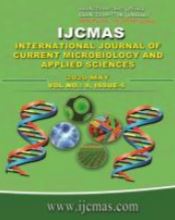


 National Academy of Agricultural Sciences (NAAS)
National Academy of Agricultural Sciences (NAAS)

|
PRINT ISSN : 2319-7692
Online ISSN : 2319-7706 Issues : 12 per year Publisher : Excellent Publishers Email : editorijcmas@gmail.com / submit@ijcmas.com Editor-in-chief: Dr.M.Prakash Index Copernicus ICV 2018: 95.39 NAAS RATING 2020: 5.38 |
To explore the suitability of various sources of potassium (K) application on K fractions (water-soluble K, Exchangeable K, 1 N HNO3 soluble K, Non-exchangeable K) through incubation study. An incubation experiment was conducted at department of soil science and agricultural chemistry, Bihar Agricultural University, Sabour, Bhagalpur in completely randomized block design with 8 treatments viz., T1 (no K application), T2 (50 per cent RDK), T3 (100 per cent RDK), T4 (150 per cent RDK), T5 (50 per cent RDK + 50 per cent K by Azolla), T6 (50 per cent RDK + 50 per cent K by vermicompost), T7 (100 per cent K by Azolla) and T8 (100 per cent K by vermicompost) replicated thrice and kept in incubator at 25 deg. Celsius and used to assess various forms of K in soil at 0, 35, 70 and 105 days of incubation. Full dose of N and P were applied in all the treatments through urea and SSP respectively. However, potassium was supplied through muriate of potash (MOP ; 60 per cent K2O), vermicompost (0.8 per cent K) and Azolla (2.62 per cent K on dry wt. basis). Experiment showed that available K content of incubated soil increases from 0 to 35 days of incubation (DAI) and decreases thereafter up to 105 DAI. Decrease in available K from 90 to 105 DAI was 13.87 % in T3. However, this decrease was only 3.97 % and 1.5 % in the treatment T5 and T6 respectively. Azolla and vermicompost maintains K availability by increasing exchangeable K and ensures constant availability of potassium.
 |
 |
 |
 |
 |